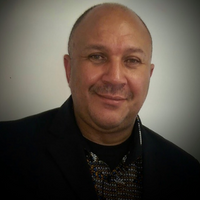The Oxford Biomedical Research Centre has sponsored a talk organised a talk by Oxford University Hospitals BAME network as part of Black History Month.

The talk on Wednesday 12 October was by Chris Lubbe, anti-apartheid activist and former bodyguard of the late South African President Nelson Mandela.
Beginning his talk, ‘Journey from apartheid to Truth and Reconciliation’, Chris remarked: “Wouldn’t it be great one day when we don’t have to celebrate Black History Month, when black history just becomes part of normal history and we don’t have to have a special month … I really long for that day.”
Chris spoke movingly about his childhood in a shanty town, finding books on a garbage dump and reading them by torchlight, and his father listening to the BBC World Service to learn the truth about what was happening in South Africa.
One shocking moving section concerned him accompanying his mother as a boy on a bus journey and her having a diabetic episode an the bus being unable to stop as they were in a ‘whites only’ area. When they finally got off the bus, they couldn’t find a public phone that non-white could use, and the police forced Chris’s mother, now seriously ill, off a ‘whites-only’ bench and onto the pavement. She finally recovered after three months in a coma in a ‘non-white’ hospital,
Chris spoke about the ‘pencil test, when a pencil was pushed into a child’s hair; if the pencil fell to the ground, the child would be classified white; if the pencil got stuck in the child’s hair, the child would be classified mixed race or ‘coloured’. “My dad said, ‘my son, we were so relieved that the pencil got stuck in your hair … if the pencil had fallen to the ground, you would have been classified white and you would have been instantly taken away from us.”
Thousands of children were forcibly removed from their parents as a result of the pencil test.
Chris spoke eloquently and calmly about being imprisoned and tortured after organising a peaceful protest and, following the release of President Mandela, being able to vote for the first time. He also spoke affectionately about meeting Queen Elizabeth II, and how she had remembered receiving a letter he wrote to her as a boy, and how he never got her reply because it was intercepted by the authorities. The Queen told him his letter prompted her to lobby other world leaders to push for Mandela’s release.
Before he started his talk, the Oxford BRC’s Senior Manager, Dr Lorna Henderson, had said: “We are very pleased to work closely today with the Oxford University Hospitals BAME staff network, and very pleased to help support the event today. One of our tasks as part of the strategy is to support and work closely with partners across the trust and the hospital.”